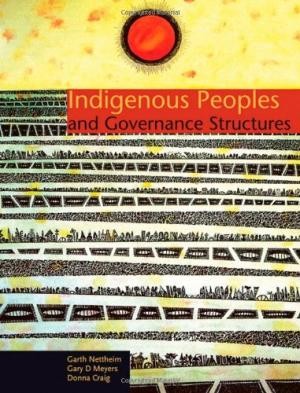Aboriginal Studies. Indigenous Australians share with the Indigenous peoples of the world a commitment to govern their lands. Increasingly, international law standards are providing for the right of indigenous participation in decisions affecting natural resources and land use. These rights are derived from common law. In practical terms, the degree of self governance is provided by national statutes and treaties or through the declarations and protocols of international bodies like the United Nations. Indigenous peoples, legal and other professionals have actively engaged a number of international and national legal mechanisms to achieve degrees of self-governance in Canada, the United States, Greenland, Demark, Norway, New Zealand and Australia. This book presents these dynamic precedents in the ongoing effort for indigenous self governance. The book, together with the companion volume on Prescribed Bodies Corporate, examines the policies and practices of various regimes of governance on Aboriginal land including the emerging regimes for the management of native title areas, and the incorporation of Indigenous interests into land administration. The authors have augmented this assessment with a comprehensive comparative analysis of regimes in operation in other jurisdictions. This study highlights the need for such, structures of engagement to be designed in ways that reflect Indigenous peoples’ interests, perspectives and aspirations. To do so, Indigenous peoples must be involved in their design and implementation. Aborigines. pp. viii, 489 #140216 Prev owner’s name on half-title. Very firm copy, spine uncreased.
Indigenous Peoples and Governance Structures: A Comparative Analysis of Land and Resource Management Rights
$60.00
Sold Out
Additional Information
| Author | Nettheim, Garth; Craig, Donna and Gary D Meyers |
|---|---|
| Publisher | Aboriginal Studies Press, Australian Institute of |
| Year Published | 2002 |
| Book Condition | VG+ (Very Good plus) |
|---|---|
| Binding Type | Softcover |
